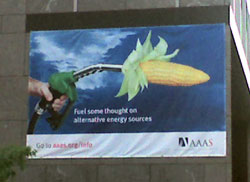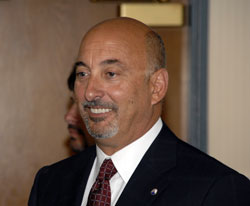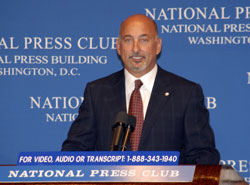 The ethanol industry has teamed up with the Indy Racing League and local retailers to help consumers really fill up and feel good by offering ethanol-enhanced fuel at a reduced price prior to most Indy races this season. This edition of Fill Up, Feel Good features the owner of Snappy Stores in Kansas City, Team Ethanol car driver Jeff Simmons and several customers who got a chance to fill up on E10 for $2.17 a gallon before the Kansas Lottery Indy 300 in April.
The ethanol industry has teamed up with the Indy Racing League and local retailers to help consumers really fill up and feel good by offering ethanol-enhanced fuel at a reduced price prior to most Indy races this season. This edition of Fill Up, Feel Good features the owner of Snappy Stores in Kansas City, Team Ethanol car driver Jeff Simmons and several customers who got a chance to fill up on E10 for $2.17 a gallon before the Kansas Lottery Indy 300 in April.
The “Fill up, Feel Good” podcast is available to download by subscription (see our sidebar link) or you can listen to it by clicking here. (5:30 MP3 File)
The Fill Up, Feel Good theme music is “Tribute to Joe Satriani” by Alan Renkl, thanks to the Podsafe Music Network.
“Fill up, Feel Good” is sponsored by the Ethanol Promotion and Information Council.






 On a walk around my hotel last night here in Washington, DC I saw this building banner for that promoted the
On a walk around my hotel last night here in Washington, DC I saw this building banner for that promoted the  I think Bobby Rahal was a big hit today at the National Press Club. There were a lot of other people from the ethanol industry on the head table but none of them got to speak or answer questions. Everyone was just excited to listen to this great competitor.
I think Bobby Rahal was a big hit today at the National Press Club. There were a lot of other people from the ethanol industry on the head table but none of them got to speak or answer questions. Everyone was just excited to listen to this great competitor.
 For the first time ever an Indianapolis 500 winner spoke at the National Press Club today. Bobby Rahal was the featured speaker at today’s luncheon with the press. His topic was the “The Greening of Racing: Ethanol Powers the Indianapolis 500.″
For the first time ever an Indianapolis 500 winner spoke at the National Press Club today. Bobby Rahal was the featured speaker at today’s luncheon with the press. His topic was the “The Greening of Racing: Ethanol Powers the Indianapolis 500.″